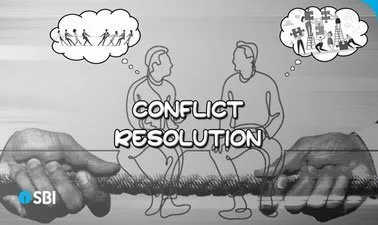
Conflict Resolution Types of Conflict Causes of Conflict Great Learning 
Conflict resolution is an important skill to have in order to maintain healthy relationships. It involves understanding the types of conflict, identifying the causes, and learning strategies to resolve them. Conflict can arise from miscommunication, misunderstandings, different values or interests, and personality clashes. Knowing how to effectively manage these conflicts can help to create and maintain positive relationships. ▼
ADVERTISEMENT
Course Feature
![]() Cost:
Cost:
Free
![]() Provider:
Provider:
Youtube
![]() Certificate:
Certificate:
Paid Certification
![]() Language:
Language:
English
![]() Start Date:
Start Date:
On-Demand
Course Overview
❗The content presented here is sourced directly from Youtube platform. For comprehensive course details, including enrollment information, simply click on the 'Go to class' link on our website.
Updated in [February 21st, 2023]
Dealing with conflicts can make you feel anxious or frustrated. There can be various reasons behind a conflict. Miscommunication, misunderstandings, different values or interests, personality clashes can all contribute to conflict. Since conflict is inevitable, learning to deal with it in a healthy way is crucial. This course will teach you how to look at the bright side of the conflict and manage it positively.
(Please note that we obtained the following content based on information that users may want to know, such as skills, applicable scenarios, future development, etc., combined with AI tools, and have been manually reviewed)
This course will provide users with the knowledge and skills to effectively manage conflicts. It will teach users how to identify the types of conflicts, the causes of conflicts, and how to look at the bright side of the conflict and manage it positively.
By taking this course, learners can develop the skills to effectively manage conflicts in their personal and professional lives. This can be beneficial for those in the fields of psychology, counseling, social work, education, and business. It can also be beneficial for those who are looking to improve their communication and interpersonal skills.
Learners can benefit from taking courses related to communication, interpersonal skills, psychology, and counseling. Additionally, they can benefit from reading books and articles on conflict resolution and attending workshops and seminars on the subject. They can also practice their skills in real-life situations and observe how others handle conflicts.
[Applications]
After taking this course, participants can apply the knowledge they have gained to their everyday lives. They can use the conflict resolution techniques to identify the causes of conflict and manage it in a positive way. They can also use the skills they have learned to help others in their community resolve conflicts. Additionally, they can use the knowledge they have gained to help create a more harmonious environment in their workplace or home.
[Career Paths]
1. Conflict Resolution Specialist: Conflict resolution specialists are professionals who help individuals and organizations resolve conflicts. They use a variety of techniques, such as mediation, negotiation, and arbitration, to help parties reach a mutually beneficial agreement. Conflict resolution specialists are in high demand as organizations increasingly recognize the importance of resolving conflicts quickly and efficiently.
2. Conflict Management Consultant: Conflict management consultants help organizations identify and address potential sources of conflict. They use a variety of techniques, such as team building, communication training, and problem-solving exercises, to help organizations create a more harmonious work environment. As organizations become more aware of the importance of managing conflicts, the demand for conflict management consultants is expected to increase.
3. Conflict Resolution Trainer: Conflict resolution trainers help individuals and organizations develop the skills needed to effectively manage conflicts. They use a variety of techniques, such as role-playing, simulations, and group discussions, to help participants learn how to identify and address potential sources of conflict. As organizations become more aware of the importance of conflict resolution, the demand for conflict resolution trainers is expected to increase.
4. Conflict Resolution Coach: Conflict resolution coaches help individuals and organizations develop the skills needed to effectively manage conflicts. They use a variety of techniques, such as one-on-one coaching, group coaching, and workshops, to help participants learn how to identify and address potential sources of conflict. As organizations become more aware of the importance of conflict resolution, the demand for conflict resolution coaches is expected to increase.
Course Provider

Provider Youtube's Stats at AZClass
Discussion and Reviews
0.0 (Based on 0 reviews)
Explore Similar Online Courses

Learn Ansible by Doing

Flutter Essentials - Learn to make apps for Android iOS Windows Mac Linux (Full Course)

Python for Informatics: Exploring Information

Social Network Analysis

Introduction to Systematic Review and Meta-Analysis

The Analytics Edge

DCO042 - Python For Informatics

Causal Diagrams: Draw Your Assumptions Before Your Conclusions

Whole genome sequencing of bacterial genomes - tools and applications

Introduction to Conflict Management

Conflict Resolution


Start your review of Conflict Resolution Types of Conflict Causes of Conflict Great Learning